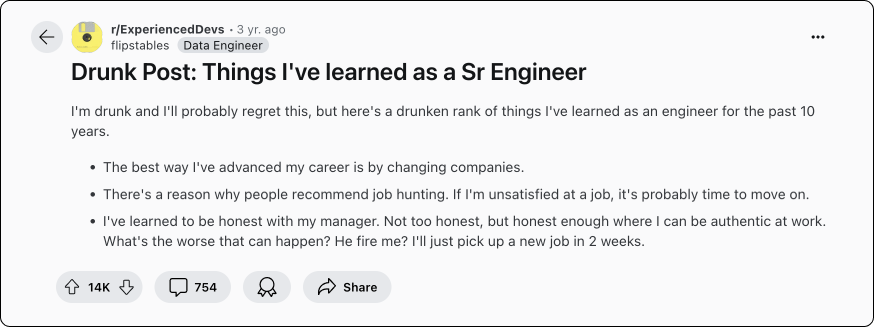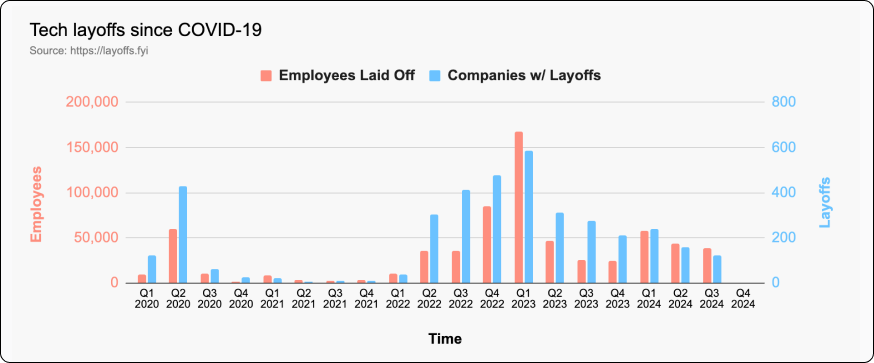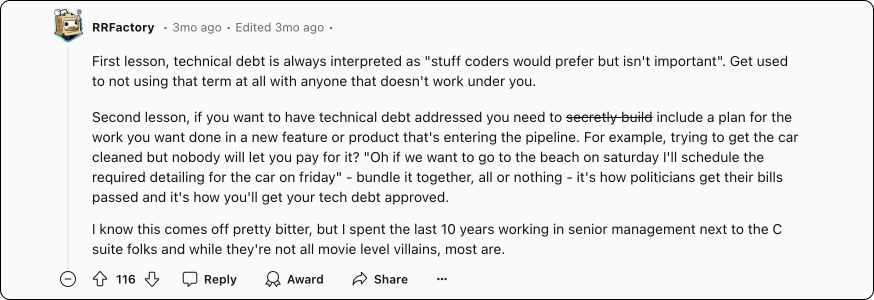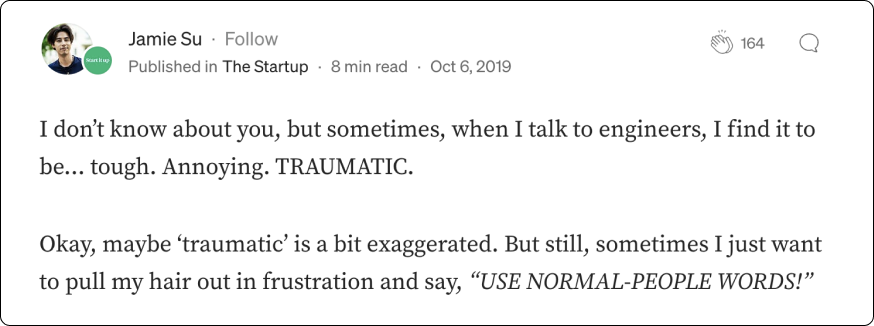Dear CTO: it's not 2015 anymore
With AI and big tech layoffs, engineering organizations have been put under a microscope like never before. Engineering leaders need to adapt to this new normal.
Engineers have been spoiled rotten for the last two decades.
It’s the harsh - but objective - truth. Pre-2022, twenty-somethings regularly landed 6-figure jobs with nothing but a boot camp on their resumes. Big Tech employers offered unlimited PTO, ‘20% time’, and lavish benefits - ex: private gyms, gourmet cafeterias, and on-campus childcare. Job security was a given; recruiters constantly swarmed engineers with offers of more: better benefits, bigger salaries, and higher titles.
If you were lucky enough to be considered tech talent, there was virtually no way to fail. You could get fired for your own incompetence and find a new role within weeks - with a better title and salary to boot.
There was an ulterior motive behind all this. Engineers fueled the software boom. It was an advantage for Google to hoard 60,000 ICs. The point was not to put them all to work, but just to have them; it bought optionality while keeping critical resourcing away from their competitors.
The downstream effect of this would transform engineering as a function. If you (like most companies) couldn’t afford the $350k price tag of a senior dev, you only had one option to attract top talent:
Build a ‘great engineering culture’
In other words, a culture where engineers don’t need to do anything that they don’t want to do.
Engineers don’t like politics, so product management transforms into a glorified mouthpiece, running interference and smoothing things over with unhappy stakeholders. Dev time is precious, so bureaucracy is put in place to ensure that requests are screened before engineers ever need to lift a finger. Developer sentiment surveys are distributed regularly to make sure that the tech team knows their feelings very, very important.
No other function is run this way, but it’s business as usual for engineering. It was for good reason - retention was critically important; losing your ICs (who were constantly solicited by Big Tech recruiters offering them bigger and better) meant you might not be able to keep the lights on.

Two decades of this arms race has birthed an extraordinary phenomenon: we have an entire generation of engineering leaders who think that hiring and retention is the point. They coddle rather than manage, disdain and avoid corporate politics, and fail to prioritize the bottom line.
This isn’t universally true of all engineering leaders, but these norms pervade engineering culture. Engineering has operated under unique circumstances for so long that most CTOs have never experienced a ‘normal’ business environment. They think priorities can be set on trust and good faith. They mistake developer experience metrics for ‘productivity’ indicators. They think that the product team sharing a roadmap should be enough to explain what engineering is working on.
They’ve been so hyper-focused on retaining their teams and staying alive that they’ve never had to justify their existence.
But these leaders don’t realize that the days of focusing on retention are over.
Software ate the world, and there’s no longer a point for Google to hoard 60,000 engineers. In 2023, Big Tech unceremoniously laid off 250,000+ workers and slashed benefits left and right. The promise of AI put the nail on the coffin: the party is over, and it’s not coming back.

This transition is gearing up to be a painful one for CTOs and their teams. Their C-Suite peers are looking at the massive cuts organizations like Google and Amazon were able to successfully make and wondering if they could do the same.
This wouldn’t be a problem in any other function; you don’t read about JetBlue making cuts to their marketing budget and immediately wonder if you could also cut your ad spend. But engineering has a unique problem because no one really knows what engineers actually do all day.
I'm including this in a pull quote to re-emphasize how weird this is: most leaders have little to no visibility into one of their business's most expensive and important core functions.
There are a couple of compounding factors that got us to this point.
To start, engineering just isn’t widely understood as a function. In business school, you learn about product positioning and operations, but nothing about maintaining InfoSec as strategic infrastructure. There’s just no good way for non-technical leaders to build even a basic mental model of how enterprise engineering works.
This makes conversations between technical and non-technical leaders uniquely painful. Virtually every conversation requires explaining foundational principles. Imagine if the CMO, before, during, and after a proposal on a routine ad campaign, needed to explain the concept of brand, why demand generation is important, and why we run ads.
It’s so bad that most engineering leaders quietly handle routine engineering tasks behind the scenes. It’s much easier to just get their team through a major update than explain [common example of maintenance that non-tech person is likely to have never heard of].

This creates an us vs. them schism between engineering and virtually every other part of the business. Engineering feels (rightly) that they aren’t understood and appreciated. The rest of the business feels (rightly) that they’re dealing with a withholding, black box. Their conversations become increasingly hostile, to the point where engineering leaders - who were often raised in environments where it was perfectly okay to avoid things they didn’t like - stop trying to explain themselves at all.
In many orgs, it’s product management that ends up picking up the slack. They act as a soothing balm - building bridges on engineering’s behalf and helping explain the what, why, and how behind engineering decisions. It’s no wonder that, when someone asks what engineering is doing, the answer is usually the product roadmap.
This has become the norm for many companies. And this is why it’s going to hurt like hell for engineering leaders as they navigate this era of streamlining:
Engineering leaders have never had control over their own narrative.
Owning your narrative is essential to playing politics. Good narratives make goals feel natural and inevitable. They help leaders get everyone - not just those they manage - excited about achieving them. They provide air cover when things get tough and kudos when things go right.
Engineering teams don’t have this. At best, they have a roadmap—a literal wishlist of things that product management would like them to do.
This is why most CEOs have no concept of the life-preserving maintenance activities their engineering teams do every day. They don’t know when refactors happen and why. They don’t understand when bottlenecks occur because they don’t know where critical institutional knowledge is held.
In short, they can’t see the work that engineers do. Engineering feels like an expensive, entitled black box that magically delivers features.
This would be bad on its own, but nature abhors a vacuum. Engineering isn’t in the driver’s seat, but it still has a narrative.
Engineers are socially inept nerds.
Their work is cold, sterile, and binary.
They don’t understand business and have no place in the boardroom.
We can’t put them in front of investors and customers.
They play foosball and drink beer all day.
This is how people have come to see engineers. Imagine a head of support (who brings home $120k a year after two decades of leading call centers), watching a bunch of twenty-somethings play ping-pong at 4 p.m. Engineers might have been needed, but they were only barely tolerated.
This is why FAANG making cuts has been such a galvanizing force for completely unrelated companies to begin layoffs of their own. People just can’t wait to believe that engineers aren’t so damn precious anymore. Enter the fierce debates we now see on ‘developer productivity’; they’re chomping at the bit to rightsize their engineering teams.
This is the existential threat that CTOs now face. The scary thing is that most of them don’t even realize it - they’re still operating like it’s 2015, where the goal is hiring and retention. They’re strolling into conversations with their CFOs on ‘productivity’ with developer sentiment surveys in hand.
Their teams are sitting ducks. It’s painful to watch.
The irony of it all is that most engineering organizations outside of big-tech are already lean. Tech talent has been so expensive that most leaders outside of FAANG have learned to do a lot with very little. When over-eager business stakeholders make misguided cuts, they inadvertently put business continuity at risk by cutting core infrastructure.

This infrastructure - and the developers who built it - enabled the prosperity of the software boom. Software engineers might have enjoyed extraordinary privilege along the way, but it was for a job well done. Take a look at Big Tech’s stock performance over the last two decades; you could easily argue that these workers deserved even more.
Other functions would do well to bring the same kind of focus on enabling productivity, happiness, and autonomy to their workers. In fact, CTOs-turned-CEOs I know tend to be some of the most kind, creative, and abundance-minded leaders I’ve ever had the pleasure to work with. They have an inherent understanding on the importance of culture and making people feel valued.
But they - and their teams - won’t survive if they keep their heads in the sand. Just in this article, I probably made you feel all sorts of emotions about engineers. I did nothing to change your lived experiences; I just organized my thoughts, chose words carefully, and added necessary context. That’s the power of narrative. Good ones ring as truth because they help explain and reinforce our own experiences.
That’s why it’s so important for engineering leaders to acknowledge that times have changed. If they don’t, it’s not just their teams and careers at stake - but the very continuity of the businesses they worked so hard to build.
Are engineers a bunch of spoiled, overpaid geeks who were long overdue for a reckoning? Or are they the core infrastructure of revenue & innovation that we could all learn from? Whether or not CTOs choose to step up will make all the difference.
After all, if you won’t write your story, someone else will.
Christine Miao is the creator of technical accounting–the practice of tracking engineering maintenance, resourcing, and architecture.
There are plenty of tools that track the byproducts of engineering–features, deployment velocity, and roadmap–but none of those will cut it when as engineering orgs face more scrutiny than ever before. Technical accounting surfaces the work of engineering itself. Think: visualizing and quantifying the impact/implications of refactors, major migrations, and technical debt in a simple and intuitive way.
A huge thank you to Matthew Casey, Sofia Hou, Mike Morreale, and Evan Kozliner for reading and proofing versions of this.







While I agree that "creating a culture" was top-of-mind for CTO's in the "fatty years", I think there is a very important point that is not mentioned here. Hiring is a way of gaining power within an org. It is the prime and proven way to do exactly the "politics" the CTOs apparently "weren't doing enough of". What if we flip the idea here to "instead of trying to obtain influence and inflate headcount, CTOs should focus on building product and delivering value"? The "can you just use NORMAL WORDS" comment is a strange aside, and showing the person who wrote it in a very negative light. I know plenty of engineers who can use "normal worlds" alright, should anyone bother to actually listen. But the trend of the "fatty" years would be to prevent engineers from speaking to anyone because there was a thick (and thickening) layer of management which was laser-focused on usurping access to stakeholders.
Personally, I think "the big shrink" will likely do very well by CTOs who can get back into the building mindset and the experienced engineers who will suddenly find themselves in a position where there is no insulating layer of middle management between them and the C-suite. Time will tell.
I think this mistakes a short term correction for a long term trend.
Current AI models aren't nearly good enough to even approximate a junior-junior developer. Let alone compensating for not-having top talent.
On the contrary, AI is tremendously useful for many low-skilled repetitive tasks, such as help center work. In my mind the AI revolution people dream about is still at least 20 years away. And could turn out much like Fusion turns out to be always 10 years away.
Regardless, corrections are normal things in a market. It doesn't invalidate the trend though. I predict the next five years we will see the IT job market not only recover, but boom. Precisely because the world is made of software.
The only genuine long term risks are wars and an increased frequency in disasters.